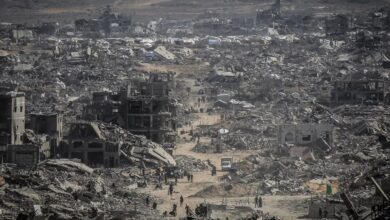TEL AVIV – At times, Tel Aviv's thriving protest encampment resembles an earnest debating society, at other moments it seems more like one huge street party, or a meandering music festival, or simply a sun-soaked sit-in.
Born out of outrage over Israel's sky-high property prices, the protest movement has morphed in less than a month into a nationwide phenomenon that represents a mammoth mix of constituencies embracing many strands of Israeli society.
Some participants fear the ever-expanding list of grievances is diluting the original message of outrage at the daunting cost of living. But the haphazard enterprise shows no sign of deflating just yet, and the government is clearly anxious.
"For years our leaders ignored the country's social problems and the plight of the people. This should be a wake-up call and they can't brush it aside," said Irit Gabay, 58, a social worker taking part in a curb-side debate on the welfare state.
City authorities say the protesters have set up more than 1000 tents, mostly down the tree-lined heart of Rothschild Boulevard – an elegant, upmarket thoroughfare dotted with famous, fiercely expensive Bauhaus apartment blocks.
Last weekend more than 250,000 people hit the streets of Israel's commercial capital to demand reform. This weekend, protests are planned in smaller cities around the country to show the broad appeal of their rallying cry for social justice.
Prime Minister Benjamin Netanyahu, facing the biggest, and most unexpected challenge to his 2-1/2-year rule, has hastily established a committee to look into the demands of the mainly middle-class demonstrators. It has a month to report back.
Analysts believe it will offer just enough concessions to deflate the movement and ministers hope that once universities and schools reopen starting next month, the hordes milling down Rothschild will melt away just as fast as they popped up.
For now, though, there is little evidence that the mostly young crowds that have taken possession of the boulevard look willing to let go. They are having too much fun.
"All that is good about Israel is on show here," said Sharon, a student from Jerusalem who declined to give her surname. "It is like Plato's republic. People who never talked to each other are suddenly connecting. It's beautiful."
LOOKING FOR LOVE AND SOLUTIONS
The camp has taken on a life of its own.
Grubby silver tents snake along the walkway, interspersed by stalls promoting everything from animal welfare to rights for fathers. There is a soup kitchen, puppet shows for small children, a paddling pool, a dating agency for demonstrators seeking streetside romance, and numerous, impromptu music gigs.
"Please, no Beatles," one sign warns the roaming guitarists.
Amidst the organised chaos are small spaces of pavement set aside for sofas and chairs that mark out the debating arenas where Israel's many problems are discussed late into the night.
"The government brainwashed people for years saying the main problem was the Arabs. Our election campaigns were dominated by the peace process," said Gilda Wheistahl, 29, who works as an economist for a big medical company.
"Now people have woken up and we want to talk about our day-to-day problems…The trouble is everyone wants something a bit different and it will be hard to see how to split the pie."
Netanyahu, a firm believer in market capitalism, will argue there is very little pie to split, and many of the protesters' demands, such as higher taxes for the rich, rent controls and an end to privatisations, will be anathema to him.
But other core demands, such as releasing more state land for public housing projects, might be easier to accommodate.
"We lack 120,000 houses in this country. People can't afford to buy a place to live and many are now finding it hard to rent. That is why the protests are so popular," said Simon Dhan, a youthful real estate broker wandering through the encampment.
A few right-wing nationalists have also pitched tents in the city, telling protesters that the solution to the housing crisis is to build more Jewish settlements in the occupied West Bank, where Palestinians hope one day to create an independent state.
Protest leaders, anxious to avoid accusations they promote a left-wing political agenda, have accepted the settlers into their ranks, but the latecomers' arguments win little support.
"People want houses around Tel Aviv, not in remote settlements. Here is where all the work is," said Dhan.
Unlike the Arab Spring revolts that have redrawn the Middle East this year, Israelis are not seeking regime change. They live in a mature democracy. Nor has there been any violence in Tel Aviv, with the crowds even waiting at traffic lights during their marches to underscore that they are law-abiding citizens.
However, a faint echo of Cairo's Tahrir Square is audible, and at least some Israelis recognize that they owe an unlikely debt of gratitude to some of their downtrodden Arab neighbours.
"I think they did inspire us. They showed that if you want to get things done, you have to get up out of your chair," said Itamar Almog, a restaurant manager who was pushing his small twins through the throngs on a hot summer evening.
"Before, we never even spoke to each other. I used to think I was the only person struggling to get to the end of the month. Now I realize we are all in the same situation."


